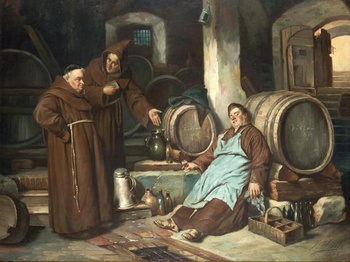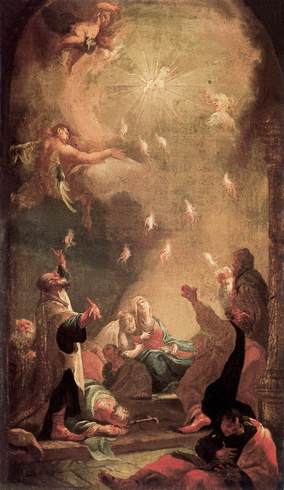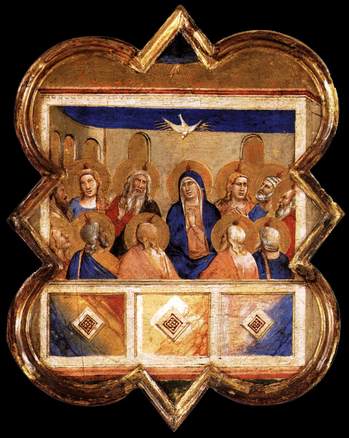Be living sacraments of Christ’s presence in the world leading all to eternal life
I am slowly reading a book written by Dom Michael Casey, a Cistercian monk from the Abbey of Tarrawara (Australia), The Road to Eternal Life, a series of reflections on the Prologue of the Rue of St Benedict. With all the talk of being a good witness and yesterday’s emphasis on our destiny in Christ, I thought Dom Michael’s reflection on boasting in the Lord makes some sense for us today. I recommend the book.
“And again he says, ‘Let the one who boasts, boast in the Lord’.” (2 Cor 10:17 quoted in the Rule of St Benedict, Prologue v. 32)
The one in the New Testament who speaks most about boastfulness is Saint Paul. He sees boasting as an expression of an autonomy that weakens a person’s total reliance on God-that is, it weakens faith. Those who think that religion is simply a matter of conforming to the precepts of the law, or perhaps so twisting the precepts of the law so that they are comfortable, have not yet learned the art of putting their trust in God, relying on God’s mercy. They are locked into the schemes of self-perfection that they themselves have crafted. The end of such self-assurance can be only disaster. As Saint Ignatius of Antioch wrote to Polycarp, “The one who boasts has already come to nothing”.
Continue reading Be living sacraments of Christ’s presence in the world leading all to eternal life
Memorial Day 2012
Holy Spirit Day
present
dwell within us,
souls!
Two new Doctors of the Church: The Lord’s effective witnesses in the world
Reminding us that the Holy Spirit “continues to inspire women and men who engage in the pursuit of truth” Pope Benedict announced that on October 7, at the beginning of the Ordinary Assembly of the Synod of Bishops, he would proclaim St. John of Avila and St. Hildegard of Bingen as Doctors of the Church. “These two great witnesses of the faith lived in very different historical periods and came from different cultural backgrounds,” he said. “But the sanctity of life and depth of teaching makes them perpetually present: the grace of the Holy Spirit, in fact, projected them into that experience of penetrating understanding of divine revelation and intelligent dialogue with the world that constitutes the horizon of permanent life and action of the Church.”
The Pope continued: “Especially in light of the project of the New Evangelization, to which the Assembly of the Synod of Bishops will be dedicated, and on the vigil of the Year of Faith, these two figures of saints and doctors are of considerable importance and relevance.”
Pope: live according to the Spirit of unity and truth; the beg the Spirit to guide us to objective Truth
I am happy to celebrate this Holy Mass with you – a Mass animated by the Choir of the Academy of Santa Cecilia and by the Youth Orchestra, which I thank – on this Feast of Pentecost. This mystery constitutes the baptism of the Church, it is an event that gave the Church the initial shape and thrust of its mission, so to speak. This shape and thrust are always valid, always timely, and they are renewed through the actions of the liturgy, especially.
This morning I want to reflect on an essential aspect of the mystery of Pentecost, which maintains all its importance in our own day as well. Pentecost is the feast of human unity, understanding and sharing. We can all see how in our world, despite us being closer to one another through developments in communications, with geographical distances seeming to disappear – understanding and sharing among people is often superficial and difficult. There are imbalances that frequently lead to conflicts; dialogue between generations is hard and differences sometimes prevail; we witness daily events where people appear to be growing more aggressive and belligerent; understanding one another takes too much effort and people prefer to remain inside their own sphere, cultivating their own interests. In this situation, can we really discover and experience the unity we so need?
Don’t forget the dog at the Liturgy
The Pentecost
A blessed Pentecost!
Much can be said of the Holy Spirit on Pentecost but I will limit myself to a few items.
The Holy Spirit is understood and taught by the Magisterium of the Catholic Church as being:
1. “the soul of the Church”;
2. “the principle of being and life in the Church… [as Divine Being who] welds together the members of the Church among themselves and with Christ the head”;
3. as “Where the Church is, there is also the Spirit of God; and where the Spirit of God is, there is the Church and all grace” (St Ignatius of Antioch);
4. “the heart of the Church (for Ecclesiae)” (Aquinas);
and
5. [the Spirit is the principle] that principle … that unites, quickens, teaches, sanctifies the Church, indwells in her, communicates the riches of the one to the others” (Aquinas).
Come Holy Spirit, come through Mary.
Saint Philip Neri
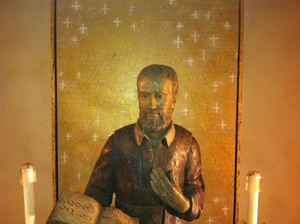 Father, you continually raise up your faithful to the glory of holiness. In your love kindle in us the fire of the Holy Spirit who so filled the heart of Philip Neri.
Father, you continually raise up your faithful to the glory of holiness. In your love kindle in us the fire of the Holy Spirit who so filled the heart of Philip Neri.
In so many ways Saint Philip Neri is a saint, a witness to the work of the Holy Spirit in this world. This fact is borne in the activity of his life for the salvation of souls. He was a close friend of the Benedictines, Dominicans, and the Jesuits. A well-sought after confessor and preacher, he drew the keen attention of Popes, bishops and saints. Who can’t relate to a man who had a keen sense of humor, a love for all people, especially the youth, and a miracle-worker. The Church has named Saint Philip one of the patrons of Rome.
My love for Philip Neri leads me to hope that Connecticut, preferably New Haven, will see an Oratory in the future.
Among other things today, I watched the 2010 film “Saint Philip Neri: I Prefer Heaven,” with Gigi Proietti, Adriano Braidotti, Francesco Salvi, and Roberto Citran. The director is the wonderful Giacomo Campiotti whom I met last fall in NYC while he was stateside promoting another film of his.
A brief biography of Saint Philip Neri.
Saint Philip Neri, one of the glories of Florence, was born of an illustrious Christian family in that city of Tuscany, in 1515. His parents lived in the fear of God and the observance of His commandments, and raised their son to be obedient and respectful. Already when he was five years old, he was called good little Philip. He lost his mother while still very young, and it seemed he should have died himself when he was about eight or nine years old. He fell, along with a horse, onto a pavement from a certain height. Though the horse landed on top of him, he was entirely uninjured. He attributed his preservation to a special intervention of God, destined to permit him to dedicate his life to the service of God.
He fled from a prospective inheritance to Rome, where he desired to study, and there undertook to tutor the two sons of a nobleman who offered him refuge. He led so edifying a life that word of it reached Florence, and his sister commented that she had never doubted he would become a great Saint. He studied philosophy and theology, and after a short time seemed to need to study no longer, so clear were the truths of God in his mind. He always kept the Summa Theologica of Saint Thomas Aquinas near him for consultation; this and the Holy Bible were his only books.
Saint Philip seemed surrounded by a celestial splendor, the effect of his angelic purity, which he never lost in spite of the many dangers that surrounded him; he came victorious from every combat, through prayer, tears and confidence in God. He often visited the hospitals to serve the sick and assist the poor. At night he would go to the cemetery of Saint Callixtus, where he prayed near the tombs of the martyrs.
He attracted a number of companions who desired to perform these devotions with him. He loved young boys most of all; he wanted to warn them against the world’s seductions and conserve their virtue in all its freshness. He would wait for them and talk to them after their classes; and many whom his examples impressed consecrated themselves to God. Assisted by his excellent confessor, he founded a Confraternity of the Most Holy Trinity for the relief of the poor, convalescents, and pilgrims who had no place of refuge. He gave lodging to many in the great jubilee year of 1550, even receiving several complete families in the houses he had obtained.
At the age of 36 he was not yet a priest, and his confessor commanded him under obedience to receive Holy Orders, which he did in the same year of 1551. He joined a society of priests and heard many confessions. Saint Ignatius of Loyola called him Philip the Bell, saying he was like a parish church bell, calling everyone to church, but remaining in his tower — this because he determined so many souls to enter into religion, without doing so himself. He himself was about to follow Saint Francis Xavier’s renowned examples, by going to India with twenty young companions, but was advised by an interior voice to consult a saintly priest. He was then told that the will of God was that he live in the city of Rome as in a desert.
The famous Society of Saint Philip, called The Oratory, began when a group of good priests joined him in giving instructions and conferences and presiding prayers; for them he drew up some rules which were soon approved. He became renowned all over Italy for the instances of bilocation which were duly verified during his lifetime. Many holy servants of God were formed in the Oratory, a society of studious priests, made ready by ten years of preparation in the common life for a service founded on sacerdotal perfection. Saint Philip died peacefully in 1595 on the Feast of Corpus Christi at the age of 80, having been ill for only one day. He bears the noble titles of Patron of Works of Youth, and Apostle of Rome.
[Source: Les Petits Bollandistes: Vies des Saints, by Msgr. Paul Guérin (Bloud et Barral: Paris, 1882), Vol. 5.]
***The image is from the Oratorians of the St Boniface Oratory, Brooklyn, NY.
Saint Gregory VII
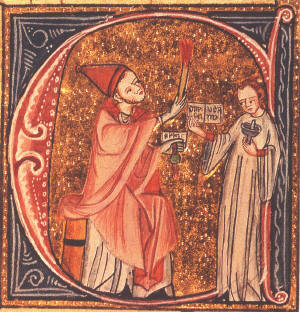 The figures of the medieval period in church history
The figures of the medieval period in church history
is not high on many today. Issues of ecclesial reform and religious liberty
during the 11th century are resonant today. Liturgically the Church recalls one
of the popes who worked for reform and religious freedom: Pope Saint Gregory
VII. The Tuscan pope was born between 1020 and 1025 and bore the name of
Hildebrand. Reliable facts of his Hildebrand’s life are obscure but we know his
uncle Laurentius was abbot of a Roman monastery, where he engaged his
education. Monasteries were great centers of education and culture.
